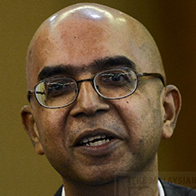 Bersih 4 is a massive rally which will begin at 2pm on August 29 in Kuala Lumpur, Kota Kinabalu and Kuching. After Bersih 4 was announced, critics asked: “Does Bersih, the organiser, have a strategy for reforming the nation?”
Bersih 4 is a massive rally which will begin at 2pm on August 29 in Kuala Lumpur, Kota Kinabalu and Kuching. After Bersih 4 was announced, critics asked: “Does Bersih, the organiser, have a strategy for reforming the nation?”
That got me thinking about the reason outsiders think a corporation exists and the reason insiders think a corporation exists.
For instance, outsiders may think a company’s business is in pencils, whereas insiders may think its business is in the manufacture and sale of writing tools.
The two understandings will result in different business strategies.
The first will cause the company’s managers to show no interest in any business other than pencils. The second will cause them to be open to conducting business in pens, paper, colours and even computers.
Bersih (more correctly, Bersih 2.0) introduces itself in its statements as the coalition for clean and fair elections.
The initial leaders of Bersih 2.0 were icons of integrity: A. Samad Said, or Pak Samad, the national poet laureate; and Datuk Ambiga Sreenevasan, a former president of the bar council. The current leader, human rights activist Maria Chin Abdullah, is equally iconic.
People learned about Bersih through its leaders.
The leaders were articulate. Their arguments were supported with data. They revealed gross deficiencies purposefully created by the government to keep itself in power.
Bersih’s publicised eight desperately needed electoral reforms: clean the electoral roll; reform the postal vote; introduce indelible ink; assure a free and fair media; allow at least 21 days for campaigning; strengthen public institutions; end corruption and end dirty politics.
With that background, we can consider Bersih’s reason for being and its strategy. What is Bersih’s reason for being? What is its strategy?
Bersih’s eight demands made it clear that “clean and fair elections” is a shorthand for much that is wrong with governance in Malaysia.
Thanks to Bersih, there is now broader and deeper public understanding of how corrupt practices are condoned in every public institution in Malaysia.
A fair assessment of Bersih must look at both its positives and the negatives.
On the positive side, public awareness has been created. NGOs have a shared vocabulary. A Parliamentary Select Committee on election reform was formed. Indelible ink was implemented. Postal votes are now better managed. Bersih has successfully raised funds from the Malaysian public.
On the negative side, the government and the Election Commission continue to ignore the millions who support the Bersih coalition’s calls for reform. Most recently, the government led by Prime Minister Datuk Seri Najib Razak refuses to acknowledge moral wrongdoing in the use of over RM2.6 billion to win the 13th general election.
Bersih’s goal is the restoration of democracy. Bersih’s strategy is to be a catalyst for change, to provoke change. Millions in the nation cried out in moral outrage over the allegations about 1Malaysia Development Berhad (1MDB) and about RM2.6 billion being deposited into Najib’s personal account.
As a catalyst, Bersih immediately asked the prime minister to go on leave in order to assure an undisturbed investigation of the allegations.
As a catalyst, Bersih also demanded ten institutional reforms to prevent scandals such as Port Klang Free Zone and 1MDB. To help the public digest the reforms, Bersih encapsulated the ten demands into four groups: clean up the government, assure the right to protest, strengthen parliamentary democracy and save the economy.
(It’s worth noting that the first group to hear the ten reforms was a gathering called by the leader of the opposition in parliament. Bersih told them their braying for the prime minister’s resignation isn’t enough. They must also commit to institutional reforms.)
The prime minister ignored Bersih. He sacked the deputy prime minister, replaced the attorney-general and kicked out four members of the Public Accounts Committee by promoting them into the Cabinet.
Bersih immediately called for the prime minister to resign. What choice did Bersih have? To remain silent would have been to collude with the ruling party!
Does Bersih’s call for Najib to resign represent a change in Bersih’s strategy? Is Bersih now anti-government?
My own reading of Bersih leads me to answer “not all!”
Bersih’s strategy is to be a catalyst for change, not to implement change; to be an educator in electoral democracy; to help people recognise the damage done by unclean and unfair elections and persistently demand change.
Bersih 4 is a response to 1MDB and the RM2.6 billion in Najib’s account. Bersih 4 is a channel for the expression of moral outrage and a call to both sides of Parliament for deep seated reform. Bersih 4 is an opportunity for other catalysts and reformers to connect with others.
Writing is much more than pencils. Democracy is much more than elections. – August 13, 2015.


Comments
Please refrain from nicknames or comments of a racist, sexist, personal, vulgar or derogatory nature, or you may risk being blocked from commenting in our website. We encourage commenters to use their real names as their username. As comments are moderated, they may not appear immediately or even on the same day you posted them. We also reserve the right to delete off-topic comments